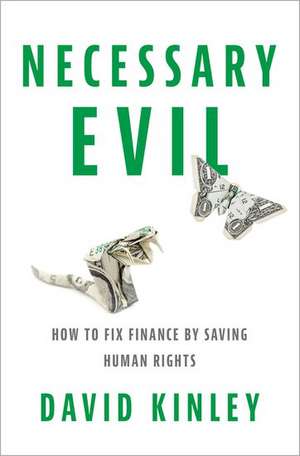Necessary Evil: How to Fix Finance by Saving Human Rights
Autor David Kinleyen Limba Engleză Hardback – 24 mai 2018
Preț: 124.92 lei
Preț vechi: 139.92 lei
-11% Nou
Puncte Express: 187
Preț estimativ în valută:
23.90€ • 25.02$ • 19.90£
23.90€ • 25.02$ • 19.90£
Carte tipărită la comandă
Livrare economică 19-25 martie
Preluare comenzi: 021 569.72.76
Specificații
ISBN-13: 9780190691127
ISBN-10: 0190691123
Pagini: 288
Dimensiuni: 239 x 160 x 28 mm
Greutate: 0.5 kg
Editura: Oxford University Press
Colecția OUP USA
Locul publicării:New York, United States
ISBN-10: 0190691123
Pagini: 288
Dimensiuni: 239 x 160 x 28 mm
Greutate: 0.5 kg
Editura: Oxford University Press
Colecția OUP USA
Locul publicării:New York, United States
Recenzii
This book is a significant step towards bridging the chasm between finance and human rights. It outlines the myriad ways in which the realization of civil, political and socioeconomic rights is dependent on the financial resources-or indeed financial security-of both individuals and states.
[A] provocatively argued book ... thoughtful reading for the humanitarian audience.
David Kinley's Necessary Evil not merely serves to demystify finance, but in so doing he renders accessible to the lay reader an understanding of the possibilities and the language with which to debate those possibilities.
David Kinley's latest call to arms represents indispensable reading for all those who care about and are working toward more sustainable finance, business, and global good governance.
Kinley reminds us that the financial system should work for the benefit of society and not the other way around.
When we get to the point where well-known financial figures refer to the sector as a 'weapon of mass destruction,' a book that explores how we got to this depressing point - and more importantly - where we go from here to repair the 'necessary evil' is most welcome.
This important new book is a powerful and eloquent demonstration of how costly this apparent separation between finance and human rights is to society and of how much we can gain from incorporating human rights considerations into finance.
A profound human rights analysis of the financial system that offers a disturbing insight of how finance has often failed to advance the human condition. But Kinley's book goes further by offering much needed suggestions for policies that can actually help make finance work for human rights.
A challenging and engagingly written book. Kinley's analysis is impressively wide-ranging, encompassing private and public finance issues including investment, tax and aid; risk and financial regulation; and human rights-impacting shortcomings in global financial architecture. He sets out a convincing blueprint for rendering the global financial system supportive rather than subversive of human rights.
[A] provocatively argued book ... thoughtful reading for the humanitarian audience.
David Kinley's Necessary Evil not merely serves to demystify finance, but in so doing he renders accessible to the lay reader an understanding of the possibilities and the language with which to debate those possibilities.
David Kinley's latest call to arms represents indispensable reading for all those who care about and are working toward more sustainable finance, business, and global good governance.
Kinley reminds us that the financial system should work for the benefit of society and not the other way around.
When we get to the point where well-known financial figures refer to the sector as a 'weapon of mass destruction,' a book that explores how we got to this depressing point - and more importantly - where we go from here to repair the 'necessary evil' is most welcome.
This important new book is a powerful and eloquent demonstration of how costly this apparent separation between finance and human rights is to society and of how much we can gain from incorporating human rights considerations into finance.
A profound human rights analysis of the financial system that offers a disturbing insight of how finance has often failed to advance the human condition. But Kinley's book goes further by offering much needed suggestions for policies that can actually help make finance work for human rights.
A challenging and engagingly written book. Kinley's analysis is impressively wide-ranging, encompassing private and public finance issues including investment, tax and aid; risk and financial regulation; and human rights-impacting shortcomings in global financial architecture. He sets out a convincing blueprint for rendering the global financial system supportive rather than subversive of human rights.
Notă biografică
David Kinley is Professor and Chair in Human Rights Law at the University of Sydney, and an Academic Expert member of Doughty Street Chambers in London. He is a former Fulbright Senior Scholar at American University Washington College of Law, and has taught at Oxford and George Washington Universities as well as the Sorbonne. He is a co-author of The International Covenant on Economic, Social, and Cultural Rights (winner of an American Society of International Law Best Book Award) and author of Civilizing Globalization: Human Rights and the Global Economy. Born in Ireland and somewhat educated in England, he now lives in Australia.
